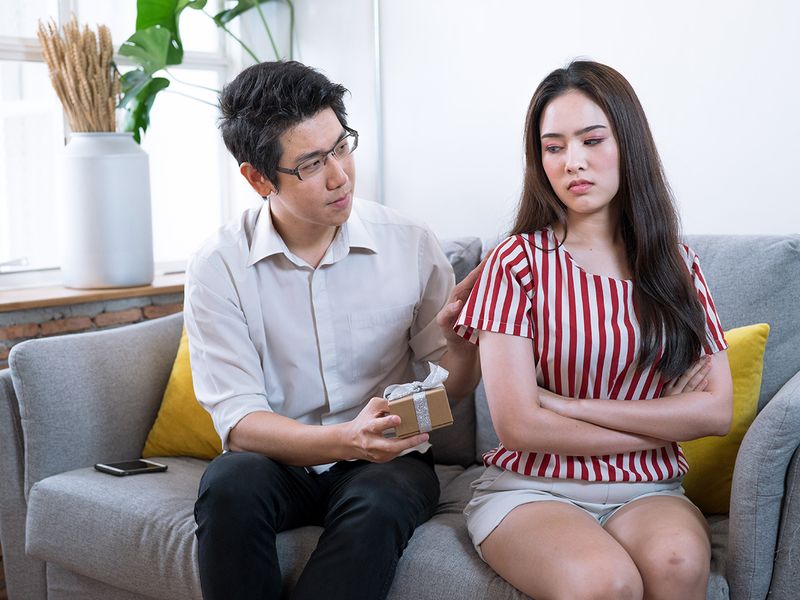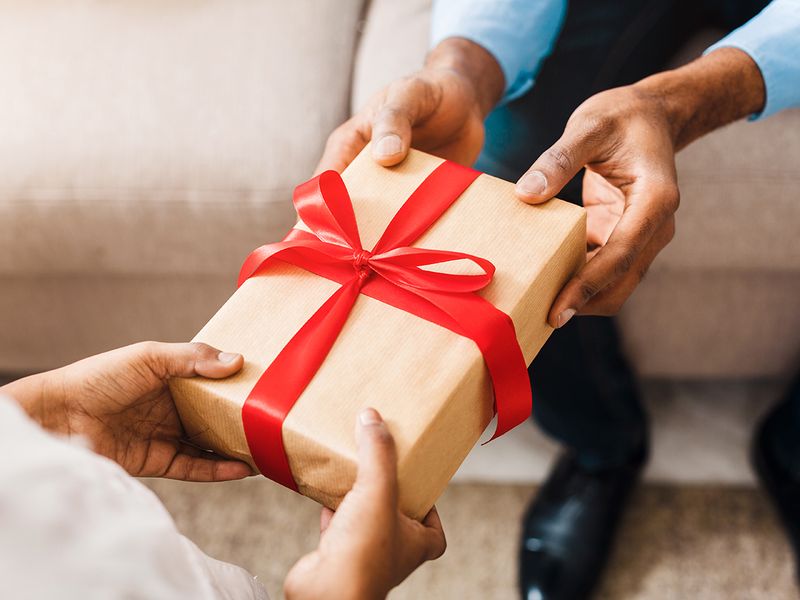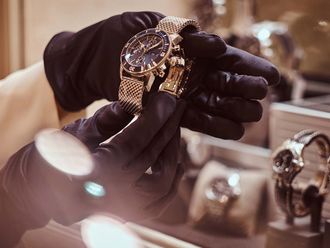
The table was piled with brightly wrapped gifts. “Surprise!” her friend said cheerfully.
She mumbled, “Thank you.”
Her friend, obviously, did not expect such an anti-climactic reaction.
Awkward silence.
Kayley Conlon, a Dubai-based British freelancer, was drowning in a sea of gifts on her birthday. Fridge magnets, books, earrings, a wallet, some creams, among other things. Conlon describes herself as staring at the range of gifts, feeling a peculiar mix of confusion and emotion. “I did feel special, but also felt very guilty. I would never be able to buy so many things for her. And when her birthday came, I could only buy a handful of presents,” she says. She was bound by financial constraints too; she was in the midst of looking for a permanent job as well.
The guilt overwhelmed Conlon to such an extent that she didn’t talk to her confused friend for a couple of weeks. “I have a habit of cutting off temporarily, when overwhelmed. I didn’t know how to address it with her, so I took some time off.” Later, Conlon admits she “nervously” told her friend, who felt rather embarrassed and apologised, which made Conlon feel infinitely worse.
She isn’t the only one who feels particularly anxious around gifts. Twenty-seven-year-old Maidhavi Sen from Dubai, a homemaker, frets about finding the right gifts for her friends. Thirty-two-year-old Joanna Shaw, a public relations consultant from Dubai is on the other extreme: She compulsively buys gifts for her friends, overwhelming them into speechlessness.
How is there such a complicated range of emotions surrounding something that is meant to give you joy?
‘People don’t feel worthy’

Gifts can generate a feeling of sickly shame and overwhelming embarrassment in a person.
If you felt that you didn’t receive enough love in your childhood, or felt alone and abandoned, you most likely will be perplexed when you receive gifts, especially expensive ones. People feel that they don’t deserve such love, explains Mohammed Yousef, specialist psychiatrist at Aster Clinic Muteena, Deira, Dubai.
“They feel that they are undeserving of kindness,” he explains. So, they feel like they have to make up for it in some way. It creates a feeling of indebtedness, says Yousef, as the person starts worrying about how to “repay” or “owe” the other person. It could also be just the way people are raised, to repay what they receive. This is based on people’s ideas of reciprocity. People want to always reciprocate on the basis of what they receive. And so, these feelings generate emotions of embarrassment and shame, if they can’t.

Gifts lead to feelings of indebtedness, causing some to think they owe others for doing something good for them....
“They think, someone has spent so much money on them, so they feel shy and embarrassed,” explains Monica Mahi Mathijs, a Dubai-based wellness expert. Some people aren’t used to such gestures, she says. They may have been made to feel that they need to “work” for love. And so, that’s how they view gifts: A sign to work harder at a friendship or relationship.
“Many of us don’t know how to label something that people have given us. Sometimes, it feels like a lack of equality,” she adds. Mathijs elaborates with an example: What if you buy your friend a book for their birthday, and they respond and buy you a concert ticket for yours? “The other person starts stewing in the thought that they can afford such gifts, but I can’t.” In the end, a seemingly innocent present can lead to someone feeling anxious, stressed, and in a cycle of trying to “repay” someone else.
While guilt can be an overriding emotion, there are other perplexing feelings surrounding gifts, too. According to a US-based Baylor University Study ‘Big Givers Get Punished For Being Non-Conformists' published in the journal Social Science Research in 2013, humans also tend to punish others for generosity. The reason? The other’s kindness has led to their own feelings of inadequacy rising to the surface.
“They feel that the generous giver made them look or feel bad,” Kyle Irwin, a co-researcher for the study, told Science Daily at the time. “It could also be that they feel jealous as if they are not doing enough for the other.”
Questioning motives: Are you trying to buy my love or friendship?

What does this expensive gift imply? What are you trying to say with this gift?
Thirty-five-year-old Elias, a German expat based in Abu Dhabi, feels rather guilty. After a fight with his partner, he bought her a rather expensive phone. She was more annoyed than touched. “I thought that I was making it up to her,” he admits rather sheepishly. Instead, she felt particularly insulted. The fight worsened. He was categorically told: “A phone isn’t going to fix this.”
Others have similar views, especially if they don’t know the person well. Neal McGavin, a British expat in Dubai, recalls feeling distinctly uncomfortable when an acquaintance tried to give him a Kindle e-reader after a work event. He had to politely decline, and couldn’t help wondering whether that gesture was some form of keeping him indebted. Niveditha Menon, a Dubai-based researcher, had to down a friend gifting her a necklace and earring set. “I don’t even know her that well. I felt like I was expected to owe her something after that,” she says.

People think that buying a gift for someone, an expensive one at that, sometimes might repair the damage after a fight. However, it can have a reverse effect. The person also wonders whether it’s some sort of bid to buy their affection
“People think that buying a gift for someone, an expensive one at that, sometimes might repair the damage after a fight. However, it can have a reverse effect,” explains Mathijs. “In the midst of that feeling of guilt, the person also wonders whether it’s some sort of bid to buy their affection,” she adds.
From the other side: The guilt of giving gifts

When does a gift stop being a gift, and becomes an overcompensation?
Gifts normally mean love and happiness; most people usually love them. However, sometimes they become a resort as a substitute for someone’s time and presence. It becomes an overcompensation, explains Cristina Miller, a Dubai-based British psychologist.
“For instance, parents who don’t spend enough time with their children, will buy them extravagant gifts out of guilt. A husband or wife might do it, just to avoid a conflict, or if they feel that they haven’t been present enough for their partner,” she says. Essentially, some people just do it, in the hope of burying a rather difficult conflict.
However, this doesn’t often work out well. The issue continues to fester, and make way for something bigger and far more adverse, later on. “In the end, the truth is, expensive and lavish gifts can’t fix gaps in a relationship or substitute time,” she says.
In some cases, people keep buying gifts compulsively for others, to fill some void in themselves. They do it, in the hope that they will be liked more, adds Miller. These kinds of people battle low self-worth and possibly a fractured self-esteem.
How do you battle gift guilt?
According to Mathijs, there are several questions for the giver and the receiver. When giving a gift, ask yourself what does this gift mean to you? What is your intention?
“Sometimes, people appreciate the thought and time that goes behind a gift, perhaps more than a store-bought present,” she adds. A letter, or a card with a sweet message might evoke more positive emotion in a person, than an expensive gift. “Gifts are about creating memories, and letting the other person know what’s special for the two of you,” she says. It’s about joy, and not performing. If it is performative, it loses its meaning.
For the receiver: If you feel guilty about receiving any kind of gift, you need to examine why, says Miller. Ask yourself the tough questions on what negative emotions gifts evoke in you and why. If you know that the person only means well, and they’ll feel loved no matter what form of reciprocity, you will be much more at ease.
Another way is to move the focus from just the gift giver. Be a good receiver. When you use the gift, check in with the person and thank them for it. That will make them feel just as special too, says Miller. An expression of wholesome gratitude goes a long way, she says.
Stop trying to always look for the perfect gift. “People cannot be perfect givers all the time. People give gifts to others to show their love and respect. It’s about honouring the gift,” says Yousef. “Whatever the reasons you have behind the gift guilt, you can turn them into something positive,” he adds.









